IFA Says Brexit Concerns Must Not Influence June and Further Milk Price Decisions

With Friesland Campina now joining Arla in holding their July milk price, IFA National Dairy Committee Chairman Sean O’Leary said Brexit related concerns should not detract from the fact that dairy markets are now recovering in earnest. For June milk, he said, the only justifiable decision for co-op boards is to hold, and to look forward to possible improvements in coming months.
“There is no denying that a weaker Sterling could challenge the competitiveness of our exports to the UK, and that the referendum result is creating undesirable uncertainty around financial and stock markets. But Brexit has also weakened the Euro against the US Dollar, improving the competitiveness of our exports to third country markets,” Mr O’Leary said.
“More to the point, the fundamentals of global dairy markets are rebalancing in earnest now. Production volumes are now falling or slowing in the most important dairy regions of the EU, with official figures for April showing production down in France, the UK, Spain, as well as here in Ireland, and slowing in Germany and the Netherlands. Output in New Zealand is back 1.5% for last season, and expected to fall another 3% in the season that has just started, while Australia is down 1% and expecting a further 1% decline. Only the US are continuing to grow production moderately, at about 1.2% for April, and this remains in line with their domestic demand growth,” he said.
“The impact of better supply/demand balance is a recovery in prices, which has been evident in the last three GDT auctions, and in rapidly increasing EU average dairy commodity prices. In the last six weeks, EU butter prices have increased by €300/t (12%), SMP and Cheddar by €70/t (5% and 3% respectively), WMP by €220/t (11%) and whey powder by €80/t (15%). For an Irish product mix, the gross returns from those commodities would be equivalent to just over 28c/l before processing costs, or a farm gate price of over 24c/l incl VAT. This ought to allow co-ops to not only fully cover the price paid for milk but also to recoup some of the support they have given milk prices, over and above market returns, in recent months,” he said.
“In this context, we urge all co-ops to follow the example of Drinagh Co-op as a starting point, and call a complete halt to any further milk price cuts in 2016,” Sean O’Leary concluded.




